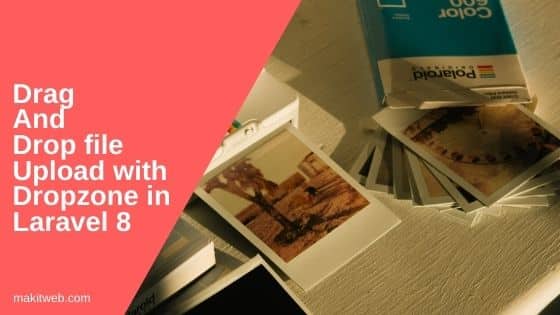Dropzone is a Javascript plugin that provides drag and drop file uploads with image previews. It is not dependent on external JavaScript libraries like – jQuery.
It is easy to add on the page.
In this tutorial, I show how you can upload file using Dropzone in Laravel 8.

Contents
1. Download
- Download Dropzone library from here
- Extract the downloaded file in
public/folder.
2. Controller
- Create
PageControllerController.
php artisan make:controller PageController
- Open
app/Http/Controllers/PageController.phpfile. - Create two methods –
- index – Load
indexview. - uploadFile – This method is used to upload the selected file of Dropzone.
- index – Load
Define file validation. I set the max file size to 2 MB (2048 Kb).
NOTE – File validation is same as defined while initializing Dropzone.
If the file is not validated then assign 0 to $data['success'] and validation response to $data['error'].
If file is validated successfully then upload the file to "files" location. Assign 1 to $data['success'] and assign Uploaded Successfully! to $data['message'].
Return $data Array in JSON format.
Completed Code
<?php
namespace App\Http\Controllers;
use Illuminate\Http\Request;
use Illuminate\Support\Facades\Validator;
class PageController extends Controller {
public function index(){
return view('index');
}
public function uploadFile(Request $request){
$data = array();
$validator = Validator::make($request->all(), [
'file' => 'required|mimes:png,jpg,jpeg,pdf|max:2048'
]);
if ($validator->fails()) {
$data['success'] = 0;
$data['error'] = $validator->errors()->first('file');// Error response
}else{
if($request->file('file')) {
$file = $request->file('file');
$filename = time().'_'.$file->getClientOriginalName();
// File upload location
$location = 'files';
// Upload file
$file->move($location,$filename);
// Response
$data['success'] = 1;
$data['message'] = 'Uploaded Successfully!';
}else{
// Response
$data['success'] = 0;
$data['message'] = 'File not uploaded.';
}
}
return response()->json($data);
}
}
3. Route
- Open
routes/web.phpfile. - Define 2 routes –
use App\Http\Controllers\PageController;
Route::get('/', [PageController::class, 'index']);
Route::post('/uploadFile', [PageController::class, 'uploadFile'])->name('uploadFile');
- The 2nd route is used for Dropzone file upload.
4. View
Create index.blade.php file in resources/views/ folder.
Store CSRF token in <meta > tag and include Dropzone library.
Dropzone Container
- Create a
<form action="{{route('uploadFile')}}" class='dropzone' >.
Script
- Read CSRF token from
<meta >tag and assign toCSRF_TOKENvariable. - Disable dropzone autoDiscover –
Dropzone.autoDiscover = falseand initialize Dropzone in<form >. - Set max upload filesize to 2 MB and valid file extensions – “.jpeg,.jpg,.png,.pdf”.
- Send CSRF token using
sendingevent –formData.append("_token", CSRF_TOKEN);. - Using
successevent check return response. - If
response.status == 0means file is not uploaded. Display error message usingalert().
Completed Code
<!DOCTYPE html>
<html>
<head>
<title>Drag and Drop file upload with Dropzone in Laravel 8</title>
<!-- Meta -->
<meta http-equiv="Content-Type" content="text/html; charset=UTF-8">
<meta charset="utf-8">
<meta name="csrf-token" content="{{ csrf_token() }}">
<!-- CSS -->
<link rel="stylesheet" type="text/css" href="{{asset('dropzone/dist/min/dropzone.min.css')}}">
<!-- JS -->
<script src="{{asset('dropzone/dist/min/dropzone.min.js')}}" type="text/javascript"></script>
</head>
<body>
<div class='content'>
<!-- Dropzone -->
<form action="{{route('uploadFile')}}" class='dropzone' ></form>
</div>
<!-- Script -->
<script>
var CSRF_TOKEN = document.querySelector('meta[name="csrf-token"]').getAttribute("content");
Dropzone.autoDiscover = false;
var myDropzone = new Dropzone(".dropzone",{
maxFilesize: 2, // 2 mb
acceptedFiles: ".jpeg,.jpg,.png,.pdf",
});
myDropzone.on("sending", function(file, xhr, formData) {
formData.append("_token", CSRF_TOKEN);
});
myDropzone.on("success", function(file, response) {
if(response.success == 0){ // Error
alert(response.error);
}
});
</script>
</body>
</html>
5. Output
6. Conclusion
You can use it as a replacement for the HTML file element or for allowing drag-drop file upload.
Dropzone container only displays the image preview.
You can view this tutorial for changing the thumbnail of the non-image file.
If you found this tutorial helpful then don't forget to share.